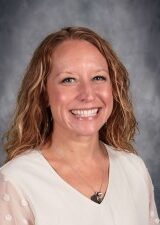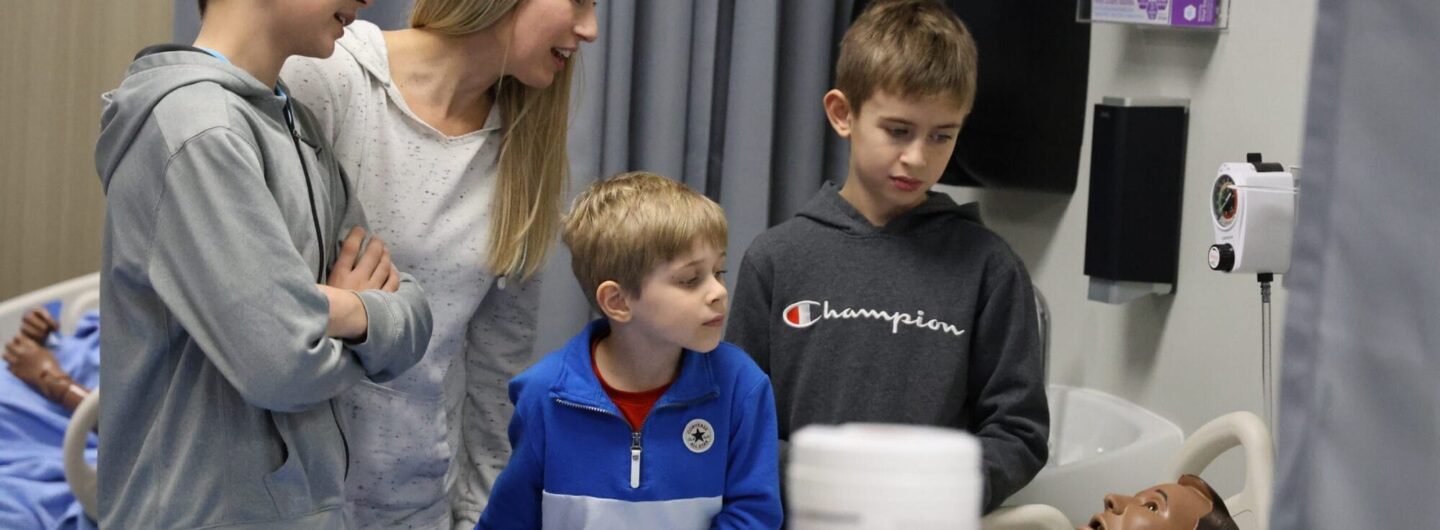The Health Sciences pathway offers an immersive exploration of healthcare industry careers in the high school’s newly renovated science wing.
This pathway is designed to provide students with both foundational knowledge and hands-on experience, preparing them for a wide range of careers in the health sciences. Through a sequence of targeted courses, students will delve into various healthcare pathways, including Therapeutic Services, Diagnostic Services, Health Information, Support Services, and Biotechnology Research and Development. By interacting with healthcare professionals and engaging in practical learning experiences, students will gain invaluable insights into the complexities of the healthcare system and the essential roles within it.
Our curriculum emphasizes real-world application and skill development, ensuring students are well-equipped for future educational and career opportunities in healthcare. From the introductory Healthcare Occupation Exploration course to advanced studies in Patient Care and Certified Nursing Aide certification, students will acquire critical competencies in patient care, medical terminology, and healthcare procedures.
Supplementary courses in Anatomy and Physiology, Organic Chemistry, and Medical Law and Ethics further enhance their understanding of the human body and the ethical dimensions of medical practice. With a focus on employability skills, safety, and professional development, the Health Occupations pathway provides a robust foundation for students aspiring to make meaningful contributions to the healthcare industry.
Through a blend of theoretical knowledge and hands-on experiences, the Health Occupations pathway empowers our students to pursue rewarding careers in the healthcare field while making a positive impact on the lives of others.
Furthermore, courses like Medical Terminology, Medical Law and Ethics, Human Relations, and Certified Nursing Aide provide students with specialized training and college credits, preparing them for success in various healthcare roles and meeting industry standards and requirements.
Health Occupations Pathway at a Glance
Health Science Courses
Healthcare Occupation Exploration, Healthcare Systems, Intro to Patient Care I and II, Common Procedures in Healthcare, Transition to Healthcare Professional, Medical Terminology, Medical Law and Ethics, Human Relations, Certified Nursing Aid
Other Suggested Courses
Anatomy and Physiology I, II, & III, Organic Chemistry I & II, Science Research, Human Development
Check out the Program of Studies for a complete list of course offerings and descriptions.
National Workforce Statistics for Registered Nurses
| 2023 U.S. Median Pay | $86,070 per year/$41.38 per hour |
| No. of jobs in 2022 | 3,172,500 |
| Projected no. needed annually | 193,100 |
Southeast Iowa Workforce Statistics
| Average wage | $32.60-$35.32 per hour |
| Openings | 265 per year |
Health Occupations Courses, Learning Objectives & Areas of Focus
Healthcare Occupation Exploration
This course explores the five Health Science Careers pathways: Therapeutic Services, Diagnostic Services, Health Information, Support Services, and Biotechnology Research and Development. Students have the opportunity to interact with professionals from each pathway.
Healthcare Systems
Focuses on how the healthcare system functions at various levels, including department, organizational, and overall healthcare environment. Students learn about individual and team responsibilities in healthcare settings and apply knowledge to solve real-life health or medical problems.
Intro to Patient Care I
Introduces essential skills and concepts required for patient care, emphasizing therapeutic and diagnostic career pathways.
Intro to Patient Care II
Continues developing skills and concepts for patient care settings, with an emphasis on therapeutic and diagnostic career pathways.
Common Procedures in Healthcare
Introduces essential skills and concepts for emergency medical situations, including legal and ethical responsibilities. Students who meet the American Heart Association requirements will become certified in CPR/AED.
Transition to the Healthcare Professional
Provides insight into safety and employment laws in the workplace, improving employability skills, and securing a job in healthcare. Topics include resume building, teambuilding, professionalism, social media, and potential job shadowing experiences.
Medical Terminology (SCC Credit)
Studies the basic language of medical science, focusing on word analysis, construction, definitions, pronunciations, spelling, and standard abbreviations. SCC offers this course on the BHS campus.
Medical Law and Ethics (SCC Credit)
Exposes students to legal concepts related to healthcare, including standard of care, scope of employment, criminal and civil acts, contracts, negligence, and ethical concepts. Co-requisite: MAP 431 Human Relations.
Human Relations (SCC Credit)
Covers fundamental principles of human relations, self-improvement, professional appearance, attitudes, limitations, and behaviors. Emphasizes individualized client care and medical practice etiquette. Co-requisite: MAP 401 Medical Law and Ethics.
Certified Nursing Aide/SCC: CNA (SCC Credit)
Emphasizes basic knowledge and skills for providing safe and effective resident care, meeting Iowa Department of Inspection and Appeals requirements. Upon completion, students are eligible for the CNA competency tests. Some Saturday attendance may be required for clinical experience.
Other Suggested Courses
Anatomy and Physiology I
Covers the anatomy and physiology of major body systems, emphasizing normal structure and function. Topics include relative position terms, tissue types, integumentary system, and skeletal system. Laboratory activities involve the study of tissues, preserved specimens, and anatomical models.
Anatomy and Physiology II
Continues from Anatomy I, covering the muscular system, nervous system, somatic senses, and digestive system. Laboratory activities include studying tissues, preserved specimens, and anatomical models. Dissection is required.
Anatomy and Physiology III
Continues from Anatomy II, covering the cardiovascular system, blood, respiratory system, and fetal pig dissection. Laboratory activities involve the study of tissues, preserved specimens, and anatomical models. Dissection is required.
Organic Chemistry I
Provides an in-depth study of organic compounds’ nature, covering structure, reactions, and nomenclature. Valuable for students entering medicine and chemistry fields.
Organic Chemistry II
Continues from Organic Chemistry I, providing a detailed look at the nature of organic compounds, including structure, reactions, and nomenclature. Valuable for students entering medicine and chemistry fields.
Science Research
Allows students to select a topic or problem to develop into an experimental research project. Students design and conduct experiments, collect and analyze data, and present their findings.
Human Development
Explores physical, social, emotional, and intellectual growth and development of children, focusing on essential skills for parents or caregivers. Topics include nutrition, toy selection, storytelling, and understanding body changes affecting overall development.



